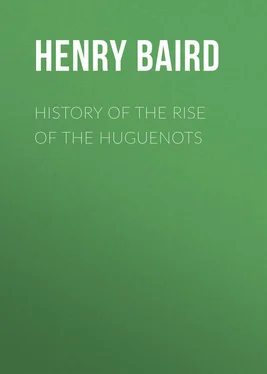Henry Baird - History of the Rise of the Huguenots
Здесь есть возможность читать онлайн «Henry Baird - History of the Rise of the Huguenots» — ознакомительный отрывок электронной книги совершенно бесплатно, а после прочтения отрывка купить полную версию. В некоторых случаях можно слушать аудио, скачать через торрент в формате fb2 и присутствует краткое содержание. ISBN: , Жанр: foreign_antique, foreign_prose, на английском языке. Описание произведения, (предисловие) а так же отзывы посетителей доступны на портале библиотеки ЛибКат.
- Название:History of the Rise of the Huguenots
- Автор:
- Жанр:
- Год:неизвестен
- ISBN:http://www.gutenberg.org/ebooks/30708
- Рейтинг книги:4 / 5. Голосов: 1
-
Избранное:Добавить в избранное
- Отзывы:
-
Ваша оценка:
- 80
- 1
- 2
- 3
- 4
- 5
History of the Rise of the Huguenots: краткое содержание, описание и аннотация
Предлагаем к чтению аннотацию, описание, краткое содержание или предисловие (зависит от того, что написал сам автор книги «History of the Rise of the Huguenots»). Если вы не нашли необходимую информацию о книге — напишите в комментариях, мы постараемся отыскать её.
History of the Rise of the Huguenots — читать онлайн ознакомительный отрывок
Ниже представлен текст книги, разбитый по страницам. Система сохранения места последней прочитанной страницы, позволяет с удобством читать онлайн бесплатно книгу «History of the Rise of the Huguenots», без необходимости каждый раз заново искать на чём Вы остановились. Поставьте закладку, и сможете в любой момент перейти на страницу, на которой закончили чтение.
Интервал:
Закладка:
In a few hours more Guise was resuming his journey toward Paris. He was told that the Huguenots of Vassy had forwarded their complaints to the king. "Let them go, let them go!" he exclaimed. "They will find there neither their Admiral nor their Chancellor." 39 39 Besides a brief Latin memoir of minor importance, there were published two detailed accounts of the massacre written by Huguenots. The one is entitled "Destruction du Saccagement, exerce cruellement par le Duc de Guise et sa cohorte, en la ville de Vassy, le premier jour de Mars, 1561. À Caens. M.D.LXII.," and having for its epigraph the second verse of the 79th psalm in Marot's poetical version, "The dead bodies of thy servants have they given to be meat unto the fowls of the heaven, the flesh of thy saints unto the beasts of the earth." (The year 1562, it will be remembered, did not commence in France until Easter Sunday, March 29th.) The account seems to have been composed on the spot and within a very few days of the occurrence. This may be inferred from the list of those who died being given only up to Tuesday, March 3d. The other narrative: "Discours entier de la persecution et cruauté exercée en la ville de Vassy," etc., enters into much greater detail, and is preceded by a full account of the early history of the Church. It was written and published a little later in the spring of 1562. Both memoirs are reprinted in the invaluable Archives curieuses of Messrs. Cimber et Danjou, iv. 103-110, and 123-156, as well as in the Mémoires de Condé, iii. 111-115, 124-149 (the former document with the title "Relation de l'occasion"), etc. Another contemporary account was written in Guise's interest, and contains a long extract of a letter of his to the Duke of Würtemberg: "Discours au vray et en abbregé de ce qui est dernièrement aduenu à Vassi, y passant Monseigneur le Duc de Guise. A Paris. M.D.LXII… Par priuilege expres dudict Seigneur." (Cimber, iv. 111-122; Mém. de Condé, iii. 115-122). To these authorities must be added Guise's vindication in parliament (Cimber, iv. 157, etc., from Reg. of Parl.; Mém. de Guise, 488, etc.), and his letter and that of the Cardinal of Lorraine to Christopher of Würtemberg, March 22 (Ib. 491, 492). Compare J. de Serres, De statu rel. et reip. (1571), ii. 13-17; De Thou, iii. 129, etc.; Jehan de la Fosse, 45. Davila, bk. iii. in init., is more accurate than Castelnau, iii., c. 7. Claude Haton's account (Mémoires, i. 204-206) may be classed with the curiosities of literature. This veracious chronicler would have it that a crowd of Huguenots, with stones in their hands, and singing at the top of their voices, attempted to prevent the passage of the duke and his company through the outskirts of Vassy, where they were apparently worshipping in the open air! Of course they were the aggressors.
Upon whose head rests the guilt of the massacre of Vassy? This was the question asked by every contemporary so soon as he realized the startling fact that the blow there struck was a signal that called every man to take the sword, and stand in defence of his own life. It is the question which history, more calm and dispassionate, because farther removed from the agitations of the day, now seeks to solve, as she looks back over the dreary torrents of blood that sprang from that disastrous source. The inquiry is not an idle one – for justice ought to find such a vindication in the records of past generations as may have been denied at the time of the commission of flagrant crimes.
The Huguenots declared Guise to be a murderer. Theodore Beza, in eloquent tones, demanded the punishment of the butcher of the human race. So imposing was the cry for retribution that the duke himself recognized the necessity of entering a formal defence, which was disseminated by the press far and wide through France and Germany. He denied that the massacre was premeditated. He averred that it was merely an unfortunate incident brought about by the violence of the Protestants of Vassy, who had provided themselves with an abundant supply of stones and other missiles, and assailed those whom he had sent to remonstrate courteously with them. He stated the deaths at only twenty-five or thirty. Most of these had been occasioned by the indignant valets, who, on seeing their masters wounded, had rushed in to defend them. So much against his will had the affair occurred, that he had repeatedly but ineffectually commanded his men to desist. When he had himself received a slight wound from a stone thrown by the Huguenots, the sight of the blood flowing from it had infuriated his devoted followers.
The Duke's plea of want of premeditation we may, perhaps, accept as substantially true – so far, at least, as to suppose that he had formed no deliberate plan of slaughtering the inhabitants of Vassy who had adopted the reformed religion. 40 40 And yet there is great force in M. Sismondi's observation (Hist. des Français, xviii. 264): "Malgré leur assertion, il est difficile de ne pas croire qu'au moment où ils se réunissoient en armes pour disputer aux protestans l'exercise public de leur culte que leur accordoit l'édit de janvier, c'etoit un coup prémédité que l'attaque du duc de Guise contre une congrégation de huguenots, composée, à ce qu'il assure, en partie de ses vassaux, et qui se trouvoit la première sur son passage à peu de distance de ses terres."
It is difficult, indeed, to accept the argument of Brantôme and Le Laboureur, who conceive that the fortuitous character of the event is proved by the circumstance that the deed was below the courage of Guise. Nor, perhaps, shall we give excessive credit to the asseverations of the duke, repeated, we are told, even on his death-bed. For why should these be more worthy of belief than the oaths with which the same nobleman had declared to Christopher of Würtemberg that he neither had persecuted, nor would persecute the Protestants of France? But the Duke of Guise admits that he knew that there was a growing community of Huguenots at Vassy – "scandalous, arrogant, extremely seditious persons," as he styles them. He tells us that he intended, as the representative of Mary Stuart, and as feudal lord of some of their number, to admonish them of their disobedience; and that for this purpose he sent Sieur de la Bresse (or Brosse) with others to interrupt their public worship. He accuses them, it is true, of having previously armed themselves with stones, and even of possessing weapons in an adjoining building; but what reason do the circumstances of the case give us for doubting that the report may have been based upon the fact that those who in this terror-stricken assembly attempted to save their lives resorted to whatever missiles they could lay their hands upon? If the presence of his wife, and of his brother the cardinal, is used by the duke as an argument to prove the absence of any sinister intentions on his part, how much stronger is the evidence afforded to the peaceable character of the Protestant gathering by the numbers of women and children found there? But the very fact that, as against the twenty-five or thirty Huguenots whom he concedes to have been slain in the encounter, he does not pretend to give the name of a single one of his own followers that was killed, shows clearly which side it was that came prepared for the fight. And yet who that knows the sanguinary spirit generally displayed by the Roman Catholic masses in the sixteenth century, could find much fault with the Huguenots of Vassy if they had really armed themselves to repel violence and protect their wives and children – if, in other words, they had used the common right of self-preservation? 41 41 It is extremely unfortunate that Mr. Froude should have based his account of French affairs at this important point upon so inaccurate and prejudiced a writer as Varillas. To be correct in his delineation of these transactions was almost as important for his object, as to be correct in the narration of purely English occurrences. If he desired to avoid the labor, from which he might well wish to be excused, of mastering the great accumulation of contemporary and original French authorities, he might have resorted with propriety, as he has done in the case of the massacre of St. Bartholomew's Day, to Henri Martin's noble history, or to the history of Sismondi, not to speak of Soldan, Von Polenz, and a host of others. Varillas wrote, about a century after the events he described, a number of works of slender literary, and still slighter historical value. His "Histoire de Charles IX." (Cologne, 1686) – the work which Mr. Froude has but too often followed – begins with an adulatory dedication to Louis XIV., the first sentence of which sufficiently reveals the author's prepossessions: "Sire, it is impossible to write the history of Charles IX. without beginning the panegyric of your Majesty." No wonder that Mr. Froude's account of the massacre of Vassy (History of England, vii. 401, 402), derived solely from this source (Hist. de Charles IX., i. 126, etc.), is as favorable to Guise as his most devoted partisan could have desired. But where in the world – even in Varillas – did the English historian ever find authority for the statement (vii. 402) that, in consequence of the necessity felt by Guise for temporizing, a little later " the affair at Vassy was censured in a public decree "? To have allowed that would have been for Guise to admit that he was guilty of murder, and that his enemies had not slandered him when they styled him a "butcher of the human race." The duke never did make such an acknowledgment; on the contrary, he asseverated his innocence in his last breath. What was really done on the occasion referred to was to try to shift the responsibility of the war from the shoulders of the papists to those of the Huguenots, by pretending to re-enact the edict of January with restrictions as to the capital.
Интервал:
Закладка:
Похожие книги на «History of the Rise of the Huguenots»
Представляем Вашему вниманию похожие книги на «History of the Rise of the Huguenots» списком для выбора. Мы отобрали схожую по названию и смыслу литературу в надежде предоставить читателям больше вариантов отыскать новые, интересные, ещё непрочитанные произведения.
Обсуждение, отзывы о книге «History of the Rise of the Huguenots» и просто собственные мнения читателей. Оставьте ваши комментарии, напишите, что Вы думаете о произведении, его смысле или главных героях. Укажите что конкретно понравилось, а что нет, и почему Вы так считаете.












